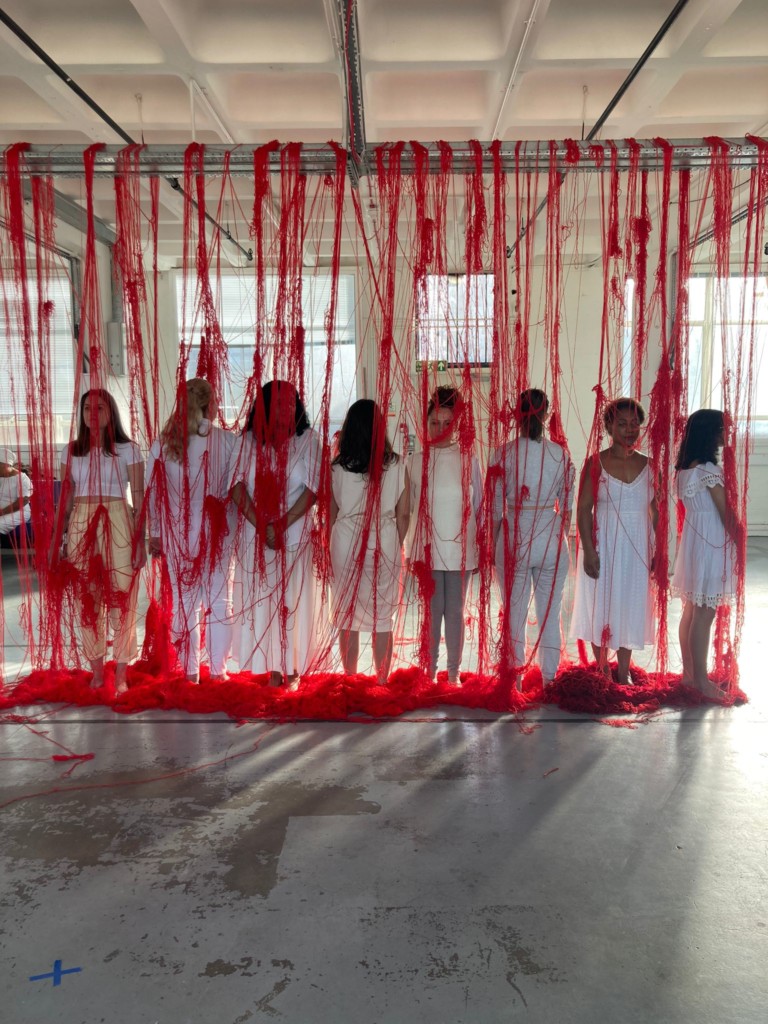Women in theatre, documentaries and workshops resisting sexism
By Ester Pinheiro
People’s Palace Projects (PPP) has been involved in several projects against gender violence, led by Professor Cathy McIlwaine (Department of Geography, King’s College London). In February 2022, together with Migrants in Action (MinA), PPP launched a creative answer against gender violence experienced by Brazilian migrant women in London; a video installation called “We Still Fight in the Dark”.
This project is based on the research Transnational Perspectives on Urban Violence Against Women and Girls (VAWG). It is an interdisciplinary project from 2016 to 2018 that examined the localised and transnational dynamics of gender violence experienced by women and girls in Maré, the largest favela complex in Rio de Janeiro (Brazil), and among Brazilian migrant women in London. Project manager, Renata Peppl, comments on the importance of this initiative: “Women lead the storytelling in this research. There is an exchange of power that enables women to take ownership of the narratives about resistance, using their own experiences.” “We Still Fight in the Dark: Violence Against Women and Girls among Brazilians in London” (2022) was created collaboratively in eight drama workshops with Brazilian migrants in London. You can watch our performance teaser below:
Women in Maré community
Women carry inspiring narratives. What if an online exhibition brought together their life stories, unpublished by traditional media but representative of their communities? “Women from Maré: Arts, Dignity and Resistance”, brings to light stories from ten women from the Maré community in Rio de Janeiro, Brazil. This is an initiative of Redes da Maré, King’s College London, People’s Palace Projects and Queen Mary University of London in partnership with the Museu da Pessoa.
The testimonies of these 10 women are available in both English and Portuguese. Here are some excerpts:
Rafaela Feitosa was born in the Parque União favela, which today belongs to the Maré neighbourhood in Rio de Janeiro. She learned to sew with her mother and, as a child, made clothes for her dolls. She worked in several sewing factories in Rio. Feitosa is now a producer of peripheral and sustainable fashion, seamstress and autonomous artisan. In 2018, she created her own brand, “Made in Maré – by Rafa”, and since 2020, she has been making reusable cloth masks which are distributed free of charge in Maré.
Whenever my sister left her seat to go to the bathroom, I would sit there, and she would oversee it. She prepared the seam, attaching the needle to the presser foot at the top. She would go to the bathroom and I would sew straight. And when she got back it was almost done. She found it weird. One day she saw it and decided to teach me properly. I learned gradually. The days she went out to work, I would sit and do something from beginning to end. A whole piece. (Rafaela Feitosa, 2022)
Iraci Rosa de Oliveira is 81-years-old from Rio Pomba town. She lives in Maré and thanks the initiative for listening to her: “Until today I couldn’t tell my story, because people are always in a rush and elderly people lost their recognition.” Iraci shares her experience with her violent partner:
He was like that, if I was talking to people, if I was laughing, he would come to fight, he couldn’t see me smiling. We were about to have our silver wedding anniversary. A friend of mine asked me, “and do you have anything to celebrate?” Wow, there my castle collapsed. Instead of having a silver wedding, I got divorced. (Iraci Oliveira, 2022)
Goals
At the community level, the idea of both projects is to give space for women from the Maré community and Brazilian migrant women to have their voices heard. In “Women in Maré: Arts, Dignity and Resistance”, the Museu da Pessoa is working directly with schools to share these women’s stories in the classroom, to raise awareness of gender violence and how it impacts women’s lives. Teachers are engaging with the project and believe the project raises an important conversation with a gender perspective within education.
On an international level, both projects are available in English. They aim to share lived experiences of women from the global south with other women around the globe, particularly in the UK where the research behind the projects started. Concerning the performance, “We Still Fight in the Dark ”, Renata Peppl is working together with MinA and Cathy Mcilwaine to launch the full version of the video at a museum, festival, or film event in the UK.
For more information, please check the website: https://transnationalviolenceagainstwomen.org/
The research projects outlined in this blog are funded by ESRC Impact Grant at King’s College, ESRC, Newton Fund and The British Academy, in partnership with Redes da Maré, People’s Palace Projects and Queen Mary University of London and Museum of the Person.
